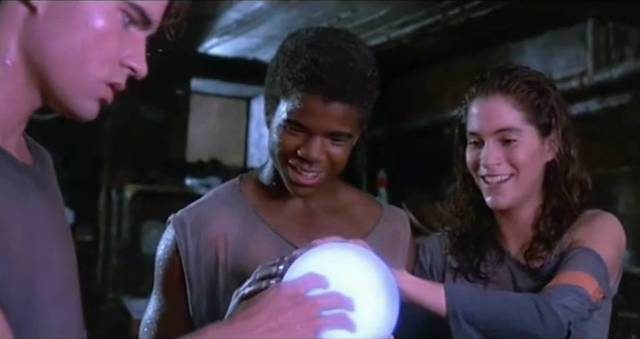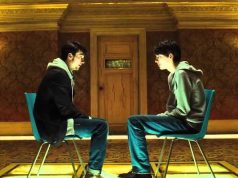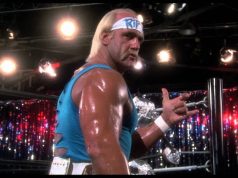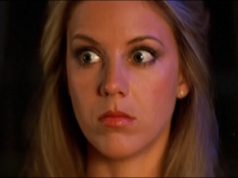
“Solarbabies” takes place in a post-apocalyptic world in which water is a scarce commodity, but no one in the movie ever gets very thirsty, not even when they have to walk across vast deserts. From an evolutionary standpoint, this is good news: after the apocalypse, humans will apparently be able to adapt to arid conditions and survive on little or no water. From a movie standpoint, it’s bad news: I am not interested in a scenario where water is scarce if no one is thirsty. A shortage doesn’t matter if nobody needs it anyway. You don’t hear anyone complaining that there’s only one Carson Daly, for example.
This chewy chunk of “Mad Max” rip-off cheese is set 41 years after things went kabluey, with all the world a barren, desolate wasteland, much like Arizona is today, only still habitable. Our primary setting is an orphanage in the middle of the desert. This isn’t your typical orphanage, though. For one thing, the kids aren’t orphans. (Definition-wise, that might be a deal-breaker right there.) They were taken from their parents shortly after birth and raised to be soldiers for the fascist post-apocalyptic government, called the Protectorate. The “orphanage” is a cross between a military academy and a prison camp, with none of the cheerful urchins singing “The sun’ll come out tomorrow” like you normally find in an orphanage.
To amuse themselves, the prisoner-orphans — the prisonorphans, if you will — play a sport called skateball that is a blend of lacrosse and hockey and is played on roller skates. Whatever happened to destroy civilization and cause a permanent drought had no effect on the supply of roller skates, evidently. Mankind’s fervent desire to play lacrosse and hockey is likewise undiminished. The prisonorphans who are the main characters in the movie play on a team called the Solarbabies. The unusual choice in team names is not explained, but keep in mind that on the list of things in this movie that are not explained, why they’re called the Solarbabies isn’t even on the first page.
Pretty much everyone at the orphanage is a teenager, except for a random younger kid named Daniel (Lukas Haas). One day while the Solarbabies are playing skateball in a concrete arena near the orphanage, Daniel wanders into a cave and finds a glowing crystal ball. He picks it up and declares, “I can hear!” Oh! We forgot to mention that Daniel was deaf. This is because the movie forgot to mention it too, until now, when he isn’t anymore. Deaf-but-not-anymore Daniel asks the glowing ball what its name is, and the glowing ball responds with a hum that Daniel can for some reason understand. The ball’s name is Boh-dai. We kind of suspected we might encounter something called Boh-dai, on account of the narrator at the beginning of the movie told us that there was a legend about a thing called Boh-dai that would return to the earth someday and restore the water, and why would the narrator mention this legend if it wasn’t about to be fulfilled? The movie may be bad, but it knows what narrators are for.
Anyway, so here’s Boh-dai, the glowing crystal ball that can heal deaf boys and restore the Earth’s normal weather patterns. Daniel takes it to the Solarbabies — he’s kind of their mascot, I think — and they are intrigued, not least because Daniel can hear now. You don’t expect the deaf kid to come out of the cave hearing. Nobody expects that. The Solarbabies, by the way, are led by Jason (Jason Patric), who is brooding and angst-ridden, as is required of teenage leading men. His girlfriend is Terra (Jami Gertz). They also have a bookworm named Metron (James LeGros), a dumb jock named Tug (Peter DeLuise), and a wise-cracking African-American called Rabbit (Claude Brooks). These are your heroes, so get used to them. FYI, they are usually on roller skates.
While the Solarbabies are examining Boh-dai, the ball makes it rain inside their cabin. Bear in mind, it never rains in this world at all, let alone indoors, and hardly ever because a supernatural orb has caused it to do so. Everyone talks endlessly about how precious water is, and how they have to earn their water rations, and so forth, but you know what they do now that it’s pouring down on them? Scamper around in it like children. No effort is made to save or collect this allegedly rare staple of life. So I return to my original position of either assuming the people in this world don’t actually need water to live, or else not caring about them.
Meanwhile, there’s a teenager named Darstar (Adrian Pasdar) who is an outcast from the other kids because he’s very quiet and appears to have some kind of power over birds. Seriously, the birds do his bidding. It’s weird, and it’s — get this — never explained. Darstar skulks around spying on the Solarbabies and, having no ball of his own, plays with Boh-dai when they aren’t around. Then suddenly there is a scene where the Solarbabies can’t find Daniel. “I think he went looking for Boh-dai!” says Terra. “Boh-dai called to him!” Yes, that makes sense. Daniel probably went looking for Boh-dai, because Boh-dai– wait a minute, Boh-dai is missing?? This is news to us. You have to TELL us these things, movie. We can infer, now that you bring it up, that Darstar took Boh-dai, but still. You have GOT to keep us in the loop here.
Darstar wants to harness Boh-dai’s powers for himself, whether for good or evil the movie does not indicate. He figures the American Indians who tell the legend will know what to do now that their Messiahball has arrived. The orphanage overlords always warned the kids not to leave the compound lest they die in the desert, but now here’s Darstar walkin’ through it without so much as an Evian bottle. He finds himself some American Indians, who take him and Boh-dai to see a wise old man. This revered oracle examines the sphere and declares that it is the long-awaited Boh-dai, and that it is magical, both of which we already knew. Beyond that, he’s stumped. So, yeah, thanks, Andy Rooney, go back to sleep.
While Darstar is hanging out with the Indians, a platoon of Protectorate soldiers descends on the village and kills just about everyone. They’re looking for Boh-dai, which the Protectorate wants destroyed lest it bring back all the water and eliminate the stranglehold the government has on the people. (You wouldn’t know it, but apparently it is a great hardship for the people to have their water rationed.) Darstar and his purloined ball barely escape the massacre.
Meanwhile, remember the Solarbabies? They are still in this story. Daniel is indeed looking for Boh-dai, which is calling to him in a mystical, “E.T.”-like fashion. Daniel has followed the magic ball’s siren song out into the desert, where surely he will suffer under the punishing sun, especially without any water to– oh, never mind, he’s fine, and here come the Solarbabies looking for him, and they also don’t have any water, and they ROLLER SKATED halfway here, and everybody’s fine. Ugh, this movie.
They all arrive at the burned-out Indian village and find Darstar and Boh-dai. Darstar ballnapped Boh-dai from them, but that is forgiven, and now he is a friend to the Solarbabies, although they are still going to keep an eye on Boh-dai.
With the aid of some bounty hunters, the Protectorate snatches Boh-dai from the kids and sends them running. Back at Protectorate headquarters, a couple of campy villains intend to destroy the ball by blasting it with lasers. To their astonishment, the magical orb from the sky that brings rain is strong enough to withstand being blasted with lasers.
Now it’s up to the Solarbabies to rescue Boh-dai from its captors, inept though those captors may be. The kids are given assistance by the Eco Warriors, an underground group of freedom fighters who used to rebel against the Protectorate until, um, they got tired and quit. Now they live in some hidden, secret Eden where there’s lots of water and everything is beautiful and property taxes are low. Their leader is Terra’s long-lost father! Which is bizarre. Isn’t that a weird coincidence? Didn’t anyone making the movie think that was a weird coincidence? Is my threshold for weird coincidences too low?
In any event, they save Boh-dai, and the magic ball rewards them by allowing the deaths of the campy villains and then bringing rain. Boh-dai then dematerializes and flies away, and you think, well, if it could do that, why did it need to be rescued? Why couldn’t it rescue its own damn self? But forget it. That’s probably on page three of the list of things the movie doesn’t explain.
I don’t know why the Protectorate put all of its administrative focus on prolonging the water shortage in the first place, much less why they didn’t have a backup plan in case it finally rained and they lost their control over the people. They weren’t causing the drought, after all; they were just capitalizing on it. And apparently that’s the only tool they had. This is the only government I’ve ever seen that could be toppled by a thundershower. How was there no successful coup before now? Just how bad at fighting were those Eco Warriors that they couldn’t bring down a political regime based solely on the weather? This is the iron fist that you people have been afraid of all this time, giving them your children to put in fauxphanages, letting them wipe out your Native American villages in search of iridescent globes? These are the dictators you’ve bowed down to? And all because they controlled your supply of water — which by all evidence you don’t need anyway? Eh, I guess you get the government you deserve.
— Film.com





